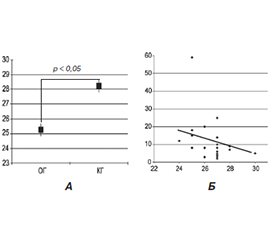Международный неврологический журнал Том 20, №7, 2024
Вернуться к номеру
Оцінка когнітивної функції в пацієнтів з метаболічно-асоційованим стеатозом печінки
Авторы: Комариця О.Й., Радченко О.М., Гук-Лешневська З.О., Стаднік С.М.
Львівський національний медичний університет імені Данила Галицького, м. Львів, Україна
Рубрики: Неврология
Разделы: Клинические исследования
Версия для печати
Актуальність. Оскільки відношення між початковою стадією стеатотичної хвороби печінки — стеатозом печінки та деменцією і когнітивною функцією (КФ) залишаються остаточно не встановленими, є потреба у вивченні такого поєднання. Мета: оцінити КФ у пацієнтів з метаболічно-асоційованим стеатозом печінки (МАСП). Матеріали та методи. Обстежено 39 амбулаторних пацієнтів із хронічними формами ішемічної хвороби серця: 26 осіб становили основну групу із супутнім МАСП і 13 пацієнтів становили контрольну групу з інтактною печінкою. Усім проведено визначення КФ за шкалою Мini-Mental State Examination (MMSE). Результати. Рівень КФ, визначений за шкалою MMSE, серед пацієнтів з МАСП був нижчим, ніж серед пацієнтів з інтактною печінкою (25,27 vs 28,22; р < 0,01). Легкі когнітивні розлади діагностували в 7,69 %, помірні — у 65,38 %, тяжкі — у 26,93 % пацієнтів з МАСП. Сумарно частота погіршення когнітивної функції (MMSE ≤ 27) серед пацієнтів з інтактною печінкою становила 33,33 %, тоді як за умови супутнього МАСП вона була вірогідно вищою (92,31 %) (р < 0,05). Висновки. КФ може бути важливим критерієм стану здоров’я та його змін, визначає перебіг хвороби, її визначення дозволяє оцінити активність синдрому ендогенної інтоксикації та стан серцево-судинної системи. Порушення когнітивних функцій має місце вже на стадії стеатозу печінки, що слід враховувати в клініці.
Background. Since the relationship between the initial stage of steatotic liver disease and dementia and cognitive function (CF) remains undetermined, there is a need to study such a combination. The aim is to evaluate CF in patients with metabolic dysfunction-associated steatotic liver disease (MASLD). Materials and methods. Thirty-nine outpatients with chronic forms of coronary heart disease were examined: 26 made up the main group with concomitant MASLD and 13 patients were included in the control group with an intact liver. In all of them, CF was evaluated using the Mini-Mental State Examination (MMSE). Results. The CF according to the MMSE was lower in patients with MASLD than among those with an intact liver (25.27 vs 28.22; p < 0.01). Mild cognitive disorders were diagnosed in 7.69 %, moderate — in 65.38 %, and severe — in 26.93 % of patients with MASLD. In total, the frequency of deterioration of CF (MMSE ≤ 27) among patients with an intact liver was 33.33 %, while it was significantly higher (92.31 %) in patients with concomitant MASLD (p < 0.05). Conclusions. CF can be an important criterion of the state of health and its changes, determines the course of the disease, allows assessing the activity of the endogenous intoxication syndrome and the state of the cardiovascular system. Impairment of cognitive functions occurs already at the stage of liver steatosis, which should be taken into account in the clinic.
стеатотична хвороба печінки; стеатоз печінки; когнітивні функції; когнітивні розлади
steatotic liver disease; hepatic steatosis; cognitive functions; cognitive disorders

